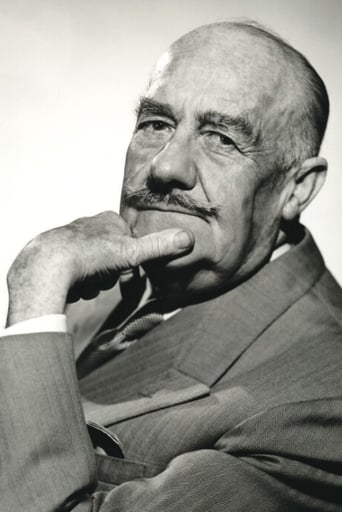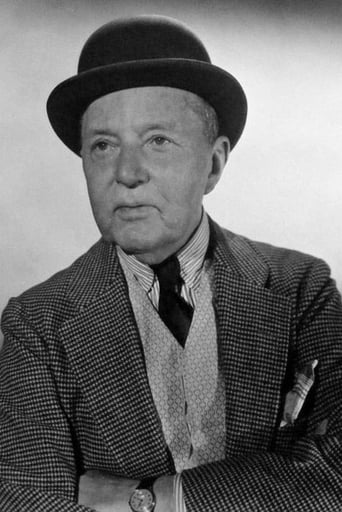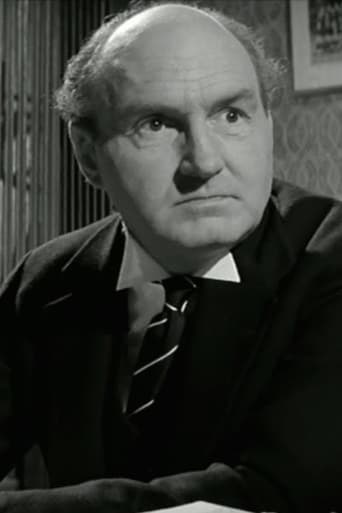SpuffyWeb
Sadly Over-hyped
Stevecorp
Don't listen to the negative reviews
ThrillMessage
There are better movies of two hours length. I loved the actress'performance.
Deanna
There are moments in this movie where the great movie it could've been peek out... They're fleeting, here, but they're worth savoring, and they happen often enough to make it worth your while.
James Hitchcock
Although it stars Gregory Peck, one of America's most popular and charismatic film stars of the period, "The Million Pound Note" is surprisingly little known today; mine is only the 17th review it has received on this site. Part of the reason is that, unlike most of Peck's output, it was not made in Hollywood but in Britain. (Peck made another British film, "The Purple Plain", during this period). Even in Britain, however, few people seem to have heard of it.The film was a based on a short story by Mark Twain. The basic idea, that of two elderly, wealthy brothers entering into an eccentric bet which affects the life of a complete stranger, is similar to that in the later American comedy, "Trading Places". That film was a contemporary satire on the "greed is good" attitudes of the 1980s, but "The Million Pound Note" is a period piece set in the early twentieth century. (The exact date is uncertain. A forty-eight-star flag flying outside the U.S. Consulate would seem to indicate that the film must be set in 1912 or later, but some of the costumes, and the absence of motor vehicles in the streets, would suggest a rather earlier date).The hero is Henry Adams, an American who finds himself stranded in England by an unusual combination of circumstances after a sailing accident and needs money for his passage back home. By chance he meets the two brothers, Oliver and Roderick Montpelier, who give him an envelope, telling him that it contains money. When Adams opens it he finds that it contains a single banknote to the value of one million pounds. (This is a fiction invented by Twain; in reality the Bank of England has never issued notes for such a sum. For the purposes of the story, however, we have to accept that the note is genuine and not a forgery).Like "Trading Places", "The Million Pound Note" is a satire on the capitalist system, but satirises it in a rather different way. "Trading Places" sends up the rapaciousness and heartlessness of the rich, represented in that film by the greedy, avaricious and corrupt Duke brothers. The satire of "The Million Pound Note" is directed less at rich people themselves than at the absurdities of the system through which they have obtained their wealth. While Adams has the note he is taken to be an eccentric millionaire. He can obtain whatever he needs without having to pay for it. (This is the reason for the wager; Oliver has bet the sceptical Roderick that mere possession of the note will enable the possessor to obtain limitless credit)Adams is accepted into the company of England's grandest High Society and is asked to back a business venture when a fellow American wishes to start up a gold mine. He does not actually have to put up any money himself; the mere fact of his association with the project is enough to start a boom in the value of the company's shares. When he temporarily mislays the note and a rumour spreads that he never actually had it in the first place, the share price plummets. It does not matter that a geological report has indicated that the company is actually on the verge of striking gold. What matters to the capitalist system is not reality but belief and confidence. A falsehood that people can believe in can be more persuasive than the truth. Businessmen may like to think of themselves as hard-headed realists, but in Twain's eyes they are as prone to fantasy and delusion as anybody else. Indeed, they are more so, because they operate within a system which depends upon fantasy and delusion in order to function.The film was directed by Ronald Neame who two years earlier had made "The Card". The two films have much in common. Both are based on literary sources, "The Card" on a novel by Arnold Bennett. Both are comedies set in Edwardian England. And both have similar themes, the importance of belief, even credulous or misplaced belief, to the money economy. (Or, to be more accurate, to the credit economy. The very word "credit" is derived from the Latin for "to believe"). Denry Machin, the hero of "The Card", is a young man who makes a fortune by promoting business schemes which, if not exactly dishonest, are nevertheless heavily dependent upon his charm, persuasiveness and plausibility. When one under-capitalised venture seems set to fail, he manages to save the situation by persuading an aristocratic lady to back him. As with Adams, the mere fact of her association with the scheme brings the investors flocking in.I would not rate this film quite as highly as "The Card", perhaps the greatest non-Ealing British comedy of the early fifties. Nevertheless, it has a lot going for it. It has some serious points to make, but makes them in an amusing way with wit and style. Gregory Peck had a wide range as an actor, but he was often at his best playing an ordinary, decent man who finds himself in extraordinary circumstances- "The Big Country" and "To Kill a Mockingbird" are two other examples- and here he makes a charming hero. It is visually attractive, being shot in what would today be regarded as the "heritage cinema" style. It may be little known today, but I would consider that it deserves to be known more widely. 7/10
MartinHafer
I almost gave this film a 7--it was very close. This film is based closely on the Mark Twain story of the same name.The film begins with Gregory Peck--alone and penniless in London. He doesn't even have the money for a meal or a place to stay. It's so bad that when a little kid throws a partially eaten pear on the ground that he's tempted to pick it up and eat it...when out of the blue, two gentlemen call to him from the balcony above. He is escorted up and they treat him kindly. After inquiring about his circumstances, they assure him that they'll make him a loan and not to worry. They hand him an envelope and instruct him to go buy himself dinner.A cursory look in the envelope shows that there is indeed money inside, but when it comes time to pay the bill, he discovers that it's a million pound note (a fictional amount, by the way) and the people in the restaurant cannot possibly make change. However, they don't seem the least bit interested in his paying and immediately extend him any credit he wants. The note along with the money, by the way, tells him that he's to have the money at no interest and he's expected to return it in one month.Later, when he goes to buy a decent set of clothes, they treat him like a bum--until they see the million pound note--at which case, once again, he's given unlimited credit and they dote on him. The same thing then happens when he goes to stay at a fancy nearby hotel. Word soon spreads all over London and now suddenly EVERYBODY wants to be his friend and extend him credit.There's a lot more that occurs in the film--particularly in regard to how the Brits view social class and wealth as well as the whole idea of being a celebrity for celebrity's sake. It's all rather droll and mildly amusing, though not as wonderful as it could have been. I am having a hard time putting my finger on why, as Gregory Peck was terrific. Perhaps it's the way everything comes together perfectly in the end--regardless, it's a very good film but one that left me feeling a tad...well...flat.
Chrysanthepop
Based on Mark Twain's novel, 'The Millionaire Pound Note' takes an interesting satirical look at the hypocrisy stemming from class distinction in the 50s England. England is a country where class and wealth are given extreme significance, especially among the rich. The film shows the hypocrisy that existed among these people, how the rich are quick to change face when in an instant they find out that you're a man of wealth and how within the next moment they revert back to their condescending selves when all wealth is lost. Interestingly, 'The Millionaire' also briefly looks at how the English perceived Americans in that era. Rich Americans were welcomed as outsiders and the poor were quickly shunned away. The fact that he's an outsider either makes him more appealing or the complete opposite. The story sticks to the main theme by emphasizing on the hypocrisy of the upper class society but at the same time it also creates a balance that prevents the movie from being a mockery of the British society. The movie drags at some point but the love story appears at the right time and there is plenty of comedy to keep one entertained. A charming Gregory Peck totally nails the part and the luminous Jane Griffiths is a treat. Reginald Beckwith, as Peck's sidekick Rock is amusing. The ending is a little predictable but the director does an overall good job by rounding it up and presenting his points.
bkoganbing
The Million Pound Note finds its way into the hands of a penniless American sailor who hasn't a pence to his name as he arrives in the United Kingdom at the turn of the last century. Gregory Peck who plays the sailor by chance runs into two elderly English brothers, Ronald Squires and Wilfrid Hyde-White, both filthy rich and are having an academic discussion around money.They give Peck a million pound note from the Bank of England and the idea is to present himself as an eccentric American millionaire and for one month live off the reputation of that note. Peck's not to pay one shilling or break the note in any way. He's to live strictly on credit for that month, live I might add in a posh London hotel, typically posh for the 1900 or so.Before I watched The Million Pound Note tonight I saw a variation on the same theme in Pretty Woman. Julia Roberts goes to a chic Rodeo Drive store in Beverly Hills and the first time arriving in her hooker working clothes, she's shown the door, but quick. But as Richard Gere said to her, they don't respect people, but credit cards yes, the higher the spending limit, the better.The Million Pound Note was Gregory Peck's first venture into comedy and if you're looking for a lot of gags and belly laughs, skip this film. What you will find is a nice piece of whimsical humor where Peck's essential decency is kind of turned on itself for laughs. He's perfectly willing to be an guinea pig as the two old gents will give him enough money to get back to America.But in this as in so many films, Peck doesn't count on falling in love with young aristocrat Jane Griffiths. She doesn't mind him being penniless or so she tells him, but snooty aunt Joyce Grenfell sure does when word comes out Peck's a fake.The Million Pound Note is a good film with Peck in a perfectly suited character for himself. And it proves the old adage that millionaires are eccentric and paupers are just crazy.





